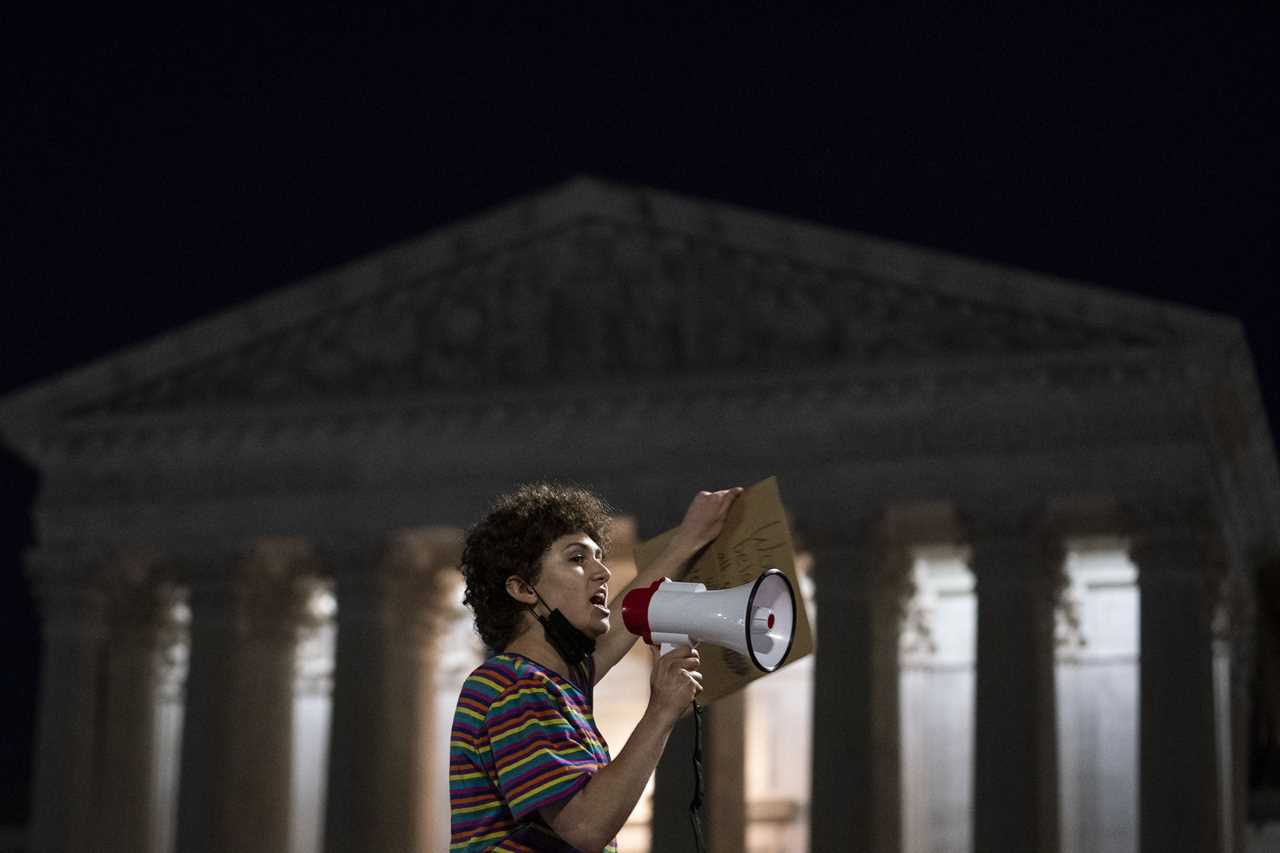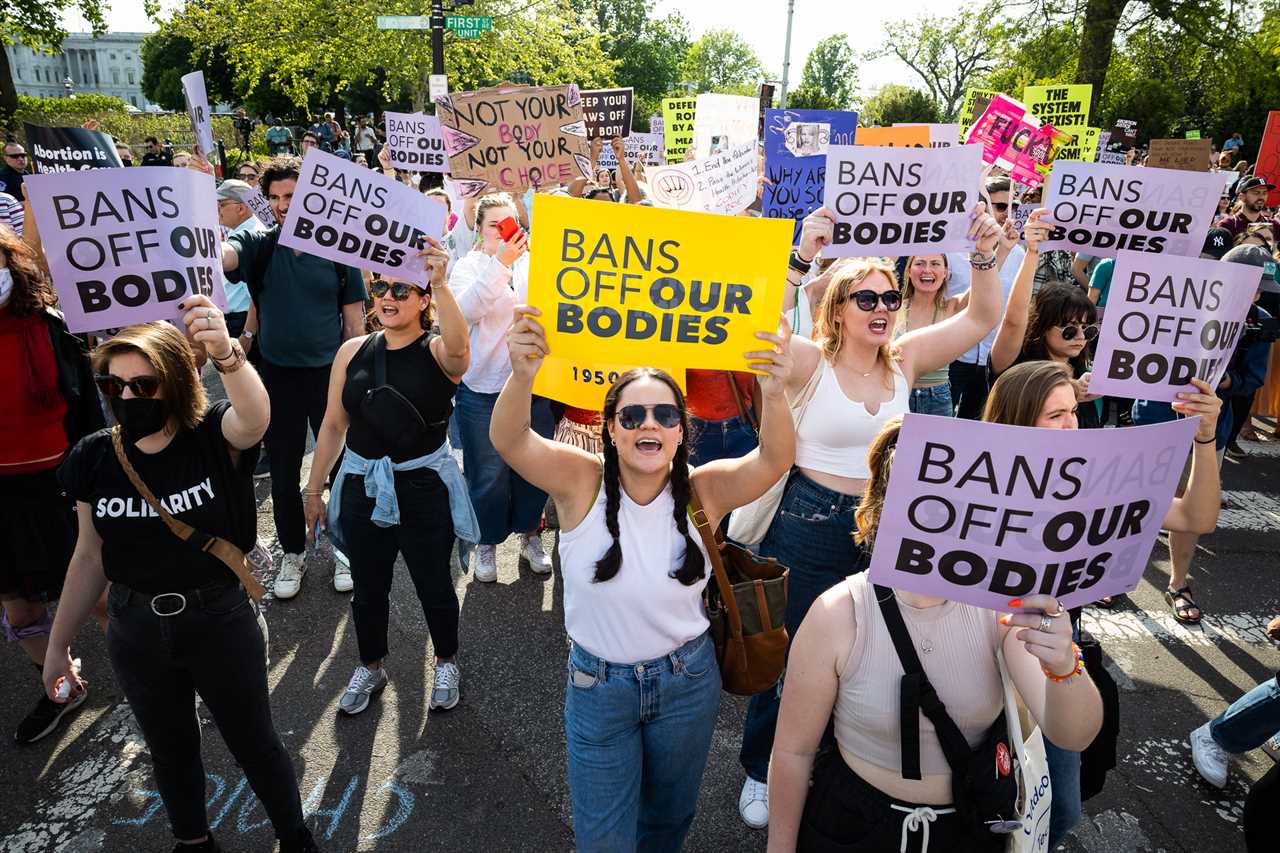
In Planned Parenthood v. Casey, the 1992 Supreme Court decision upholding Roe v. Wade, the justices in the majority expressed a magisterial confidence in their ability to settle the dispute over abortion.
“Where, in the performance of its judicial duties, the Court decides a case in such a way as to resolve the sort of intensely divisive controversy reflected in Roe,” the justices wrote, in an undeservedly oracular voice, “its decision has a dimension that the resolution of the normal case does not carry.
“It is the dimension,” they continued, “present whenever the Court’s interpretation of the Constitution calls the contending sides of a national controversy to end their national division by accepting a common mandate rooted in the Constitution.”
This call, of course, has never been answered, and yet another stark reminder came on Monday night when POLITICO published the draft Samuel Alito opinion overturning Roe.
The shocking breach of the court’s time-honored confidentiality reflected how the embittered, decadeslong contention over abortion had broken into the sanctum of the court itself, in all likelihood changing its internal culture forever.
The episode also suggested a natural rhetorical question for the Casey justices (most of whom are no longer with us): “So how is ending the national division over abortion once and for all working out for you?”
The Court’s ambition in Roe and Casey to impose its will on a hotly contested moral issue with enormous political implications, and its failure to get acquiescence — indeed, to see its own legitimacy called into question — recalls Dred Scott v. Sandford, another sweepingly ambitious decision motivated by a desire to forge social peace that catastrophically backfired.
As an ardent opponent of abortion and Roe, I see a deeper resonance between the two decisions as equally ill-reasoned acts of judicial fiat that entrenched profound social wrongs. At the very least, though, the experience of Roe and Dred Scott shows that the court is a very poor political and moral arbiter, and in trying to shut down debates, it can accelerate and intensify them instead.
Of course, Dred Scott is the Supreme Court’s decision regarding the enslaved African American of that name who was taken by his owner from Missouri, a slave state, into free territory and back into Missouri. Scott sued for his freedom on grounds that his stays in Illinois and Wisconsin territory rendered him free. He pursued his case all the way up to the Supreme Court, which notoriously ruled against him in 1857 in a 7-2 decision.
The court initially leaned toward a “narrow” decision holding that the case did not belong in the federal courts. Instead, it decided to go bigger and pronounce on the underlying matter of the Missouri Compromise, the 1820 legislation admitting Missouri as a slave state but banning slavery north of the 36°30′ parallel in the remaining portions of the Louisiana Purchase.
As David Potter writes in his classic book on the run-up to the Civil War, The Impending Crisis, “Some of the justices felt that sectional conflict had fed for a decade upon the uncertainty about the constitutional question, and that it was their judicial responsibility to settle the question.”
They settled it badly.
Chief Justice Roger Taney argued that Black people couldn’t be citizens, blowing right by the historical fact that Black people had indeed been recognized as citizens in states. Taney also ruled that the Missouri Compromise ban on slavery was an unconstitutional impairment of the property rights of slave owners. Here, he had to dance around the Constitution’s provision that Congress has the “power to dispose of and make all needful rules and regulations respecting the territory or other property belonging to the United States.”
No opponent of slavery was going to accept this stilted reasoning on behalf of a morally bankrupt position that would prevent Congress from restricting the spread of human bondage.
The ruling led to denunciations of a “political decision,” allegations that the personal commitments of the court’s majority (almost all Southern) explained its actions, and attacks on the legitimacy of the court as such. As one observer put it at the time, “If epithets and denunciations could sink a judicial body, the Supreme Court of the United States would never be heard of again.”
This was the reaction the court got from the right upon handing down Roe in 1973, and the reaction it’s getting from the left on the cusp of overturning it in 2022.
Dred Scott spawned conspiracy theories given credence by the foremost Republican politicians of the age, including William Seward and Abraham Lincoln. The future 16th president alleged coordination between top Democratic officeholders and the Supreme Court. “All understood one another, from the beginning” he maintained, “and all worked upon a common plan or draft drawn up before the first lick was struck.” (There were improprieties around the decision but nothing as elaborate as Lincoln alleged.)
The Supreme Court breach adds an element of cloak-and-dagger intrigue to the court’s work, and has only served to undermine the faith of both sides in the process.
Dred Scott brought significant turmoil to the court, with Benjamin Curtis, author of a dissent that stands the test of time, resigning.
The court, as it grapples with Roe, has an ongoing internal investigation; the justices in the prospective majority to overturn the decision are going to need security.
Dred Scott didn’t come anywhere close to ending the argument over slavery. “Overestimating the power of the judiciary to settle a troubled political question,” Potter writes, “they had committed themselves on a point around which the legislators had built an elaborate structure of evasion.”
Indeed, he continues, “Apart from a general public veneration for the judiciary, there was nothing in the circumstances to warrant the belief that six justices could settle a question which a succession of Congresses had acknowledged their inability to settle.”
Roe and Casey, too, have failed in forging any consensus. No one is going to abandon their deep-seated views on abortion because the court implicitly tells them to. To the contrary, by short-circuiting democratic deliberation on the matter, the court fueled more conflict.
Our federal system, in the ordinary course of things, has considerable give to it. Different states can try different approaches and people can re-locate to states that they find most congenial. A comprehensive edict from the court removes all this flexibility, and tramples on the ability of the peoples of different states to express their different moral views.

If Roe never had been handed down, abortion laws would presumably have continued to liberalize while at the same time, many restrictions would have remained in place. A patchwork, rough equilibrium would have been established that would have been unsatisfactory to each side but would have had democratic legitimacy and adjusted to changing mores.
The regime set up by Roe and Casey essentially shut out abortion opponents from the democratic process, while giving abortion rights supporters everything they wanted without having to undertake the work of convincing voters. This led to both sides funneling massive effort into the battle over the composition of the courts as a proxy for the struggle over abortion policy — the court didn’t remove abortion from the political realm so much as put itself, as the decider of abortion policy, at the center of the political realm.
No one can look at what’s happened over the last several days, let alone the last 50 years, and conclude this has been healthy, for the court or our politics.
When he dissented in Casey, the late Antonin Scalia invoked a portrait of Roger Taney at Harvard Law School looking deeply sad. Scalia imagined the Chief Justice despairing at what his ambitious ruling in Dred Scott had wrought. If so, Taney would have had, in the event he witnessed the court’s folly in Roe playing out over the decades, even more reason to be downcast.
Rather than settling the question of abortion, Scalia concluded, “by foreclosing all democratic outlet for the deep passions this issue arouses, by banishing the issue from the political forum that gives all participants, even the losers, the satisfaction of a fair hearing and an honest fight, by continuing the imposition of a rigid national rule instead of allowing for regional differences, the court merely prolongs and intensifies the anguish."
“We should get out of this area,” he urged, “where we have no right to be, and where we do neither ourselves nor the country any good by remaining.”
He was right, but having dominated this area for so long, it’s proving more painful for the court to exit than even the prescient Scalia might have anticipated.
----------------------------------------
By: Rich Lowry
Title: Opinion | There Are Certain Things the Supreme Court Can’t Settle
Sourced From: www.politico.com/news/magazine/2022/05/05/supreme-court-certain-things-settle-abortion-slavery-00030542
Published Date: Thu, 05 May 2022 17:55:52 EST






